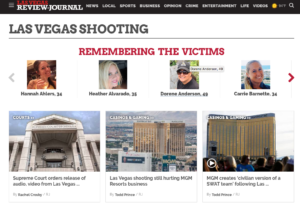Nevada’s public records act withstood another test — this one was more like a four-corner stall — when the Nevada Supreme Court ordered Las Vegas Metro to release 911 calls, video-cam footage and other records from the horrific massacre that occurred six months ago.
Five of the justices concurred, and the other two preferred to see more arguments on the merits of the case.
Thanks to the Las Vegas Review-Journal and other press outlets for their dogged pursuit of these records, the public should expect to get some insight into the police response and investigation — something Metro has kept pretty close to the vest, especially after questions were raised about some early reports from police that turned out to be inaccurate.
Credit also goes to District Judge Richard Scotti, whose initial ruling was an important foundation for the Supreme Court’s reasoning. Scotti was criticized for an earlier ruling on autopsy reports, which was overturned by the higher court. In his March 9 decision, which can be read in this document, he was spot-on in his understanding of the Nevada records statute and the cost of providing records to the public.

Metro had calculated the costs of providing body-cam videos, dash-cam videos, 911 calls and documents at between $233,750 and $458,159. Clearly, the goal was to prevent anybody in the public from actually seeing the police response to the Oct. 1 massacre on the Las Vegas Strip. There are 748 hours of video.
It’s all public record
All of it is public record. In other words, your tax dollars paid for it in the first place. And Nevada’s statutes say that body-cam footage, dash-cam footage, 911 calls and police reports are available to view and to copy at the “actual cost” of providing a copy.
From Scotti’s ruling:
Given the strong public policy in favor of production, the Media must never be compelled to pay an exorbitant fee to obtain records, even if the Media elects not to give any reason for the request. An excessive fee is the antithesis to government accountability.The Public Records Act is undoubtedly a culmination of political thought that the Media best performs its watchdog function when it has ease of access to government records. The government cannot frustrate the Media’s efforts to obtain information on behalf of the public by charging exorbitant fees.
The judge refers to “the Media” because they were the respondents in the case, but his point really goes to “the public.” The press has no special access or price for public records. It’s the same for everybody.
Judge Scotti also correctly assessed the Legislature’s intent making sure the costs covered only the act of copying the records, and the recognition of additional compensation for “extraordinary use” of resources in fulfilling a request for copies. He added 50 cents a page — the maximum allowed for documents — to the 31 cents that Metro already charges for using its copy machines.
But Metro wanted to charge $50 an hour for between 4,675 and 9,163 hours to get the information ready for the public.
Scotti again:
There is nothing in the Act that permits Metro to bill the Media for pre-copy preparations. NRS 239.054 applies to geographic information systems — not applicable to body cam data or 911 calls. NRS 239.055 applies to documents — not electronic records that are not susceptible to being printed out on a page by page basis. There is simply nothing in the Act other than NRS 239.052 that applies to body cam recordings or 911 calls. The Nevada Legislature has spoken quite clearly on this issue. The Court cannot go beyond the language and recreate in Metro an entitlement to bill for the staff and other resources needed as part of the pre-copy preparations.
It was also clear to the lower courts, including Scotti and District Judge Stefany Miley, that Metro was mainly trying to stall. They failed to show why any of the records were confidential or give a reason why release was being delayed. All that raises the question why police refused to release the information in the first place, then spent taxpayer money fighting the issue in court.
Too graphic to see
One explanation from Metro was that the videos and 911 calls were so horrifying they would cause further trauma to survivors and families of victims. That’s not a legal argument, but it’s a point worth considering.
In fact, it’s exactly the kind of discussion the press would have before deciding what to publish. Newspaper editors and TV news producers make those kinds of decisions every day, from a photo of a child-abuse victim down the street to the bombing of soldiers in a war a world away.
It’s not the police’s job to shield the public from the truth. The press is free to set its own standards, and you — the reader and viewer — are entitled to choose what you see and don’t. I have no doubt that some web site will publish every gory photo and video, every anguished plea to a police dispatcher. I will avoid them.
But there is a far different purpose in demanding access to public records: the public’s ability to evaluate the performance of the services for which it pays — including police, rescue, fire and everything else that goes into the response of an emergency, especially one of this scale.
The press fulfills this role — again, acting on behalf of its readers and viewers — by playing the watchdog and asking the questions. And then publishing the answers.
 Nevada Press Association The best in Nevada journalism since 1924
Nevada Press Association The best in Nevada journalism since 1924

This is a well-written commentary